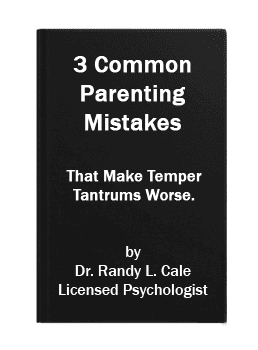
Keys To Stop Temper Tantrums
By: Dr Randy Cale
 Temper tantrums can range from the mild tantrum, where your child is stomping her feet and giving ugly looks … to the more moderate forms of outbursts where she flop’s on the floor, yells or whines loudly, and perhaps sits down in protest and throws a few toys.
Temper tantrums can range from the mild tantrum, where your child is stomping her feet and giving ugly looks … to the more moderate forms of outbursts where she flop’s on the floor, yells or whines loudly, and perhaps sits down in protest and throws a few toys.
And then there are the ballistic, severe out-of-control tantrums! Such extreme tantrums evolve for various reasons. Frequently, I see these extreme tantrums with certain strong-willed or more oppositional children. Certainly, such children are more prone to severe tantrums and outbursts.
Yet, you may not have a child with such an oppositional steak. And you might see these severe tantrums unfold when you are making changes or transitions, and your toddler or child just doesn’t’ approve. They don’t like the change …and they are going to let you know that they want it… “MY WAY MOM!”
And still, there are some kids who seem to start small, and gradually (over months) grow into these more extreme tantrums. And even on occasion, other children just seem to be wired to go ballistic from early on. These various child tendencies may mean that more or less skill is required to get through this quickly. What is important to understand is that YOU DO NOT NEED TO SUFFER WITH THESE TANTRUMS. (By the way, I have your special report and and some very cool free training for you… more about that shortly) First, i want to explain something critical about these more severe tantrums.
 For many of you learning more effective parenting skills, you may even find that changes in your parenting style provoke these extreme temper tantrums. Such severe or extreme tantrums can include extended periods of screaming, crying, shouting ugly comments, property destruction, and ultimately turning to violence and hitting. (But please don’t be dismayed if your changes in parenting seem to create a few more of these types of tantrums. I will explain why this is happening shortly!)
For many of you learning more effective parenting skills, you may even find that changes in your parenting style provoke these extreme temper tantrums. Such severe or extreme tantrums can include extended periods of screaming, crying, shouting ugly comments, property destruction, and ultimately turning to violence and hitting. (But please don’t be dismayed if your changes in parenting seem to create a few more of these types of tantrums. I will explain why this is happening shortly!)
When caught in their anger, children will do anything to try and get what they want from mom and dad. This will include hitting, kicking and going after items to destroy. The extreme appearance of your son or daughter’s upset is clearly upsetting. Yet, to be helpful, it is important that you learn a strategy, and avoid making emotional or reactive decisions that may seem to help in the moment…but make things worse over the long term.
One of the biggest mistakes is that we fall into the trap of ‘feeding’ into the tantrum. How? By first listening to their concerns, or by negotiating with them, or even trying to soothe them by finding out why they are so upset. Then, the concern turns to frustration or anger, and we may get firm. For some, we may start to argue or try to force them to go to their room.

Over and over, in various ways, we can easily end up feeding into these terrible tantrums, in the name of trying to make things better. But here’s the bottom line:
Please Mom/Dad…
Here’s a great example: I recently spent a few minutes on the phone with Jenny, a school teacher from California, who was working through one of my programs called The Tantrum Fixer. Her 3 1/2 year old son had just spent the last three days escalating his tantrums, until they qualified as ballistic. He had been tantruming several times a day, and she invested in the program because his tantrums were driving her nuts! She was at the end of her rope.
She called because she had reviewed the program, and then began the action plan. It was simple. Yet, on day 3, things were apparently getting worse. She said, “I knew it. This isn’t working for my son! He is too strong willed!”
One critical component of “The Tantrum Fixer” program is a need to make certain that you do not feed into tantrums. This means not giving in to the demands of the tantrum, and not negotiating, arguing, begging, pleading, yelling, fighting, or in any way doing battle with the tantrum. More about Jenny’s story after the two lessons below.
When you begin to make these adjustments, often you are met with a day or two of things appearing to get worse.
WHY? Because most likely… you have been feeding into the tantrum. Either with your words, your discipline efforts, your negotiation, your frustration, and even just your energy. When you stop this, usually your child doesn’t like it.
When we do…the tantrum gets stronger. The tantrum gets fed.
When you stop feeding or trying to ‘fix’ the tantrum, everything begins to change. Now for many of you, with an acting out tantrum, you will need a comprehensive game plan…so you can handle the outbursts without getting hooked by the drama of it all.
For Jenny, she was at the end of her rope. She began crying, and expressed the feeling of hopelessness, and despair. However, despite her frustration, I reminded her of one critical things she had forgotten….
More on this in just a second. First… Here’s something you might be interested in…
For now…here are two lessons to note:
Two Critical Lessons For Your Child Who Tantrums
Lesson 1: Mom and dad will no longer invest in the tantrum.
 Over and over again, children who tantrum learn that their parents are invested in their tantrums. In fact, it’s quite predictable that mom and dad will stop whatever they’re doing and come to give their energy and attention to the tantrum — in an effort to make it go away.
Over and over again, children who tantrum learn that their parents are invested in their tantrums. In fact, it’s quite predictable that mom and dad will stop whatever they’re doing and come to give their energy and attention to the tantrum — in an effort to make it go away.
It is critical that your child learn that you will not repeatedly and consistently invest in their upset. If you do, you child’s brain begins to ‘feed’ off of that energy. At first, things may seem to get better. But if you aren’t careful, the tantrums start to grow. Week by week…you see a few more… a bit stronger tantrums. This is dangerous…
Do not believe any website, any article or any advice that suggest that there is a way to talk your child through a tantrum. Yes, you can soothe the child (at times). The problem is that you will continue to spend your life doing more and more soothing and calming, and you will notice that the short term results are fantastic, but overall your child’s behavior deteriorates as they become more and more accustomed to tantruming when they don’t get what they want. Again, do not believe advice that suggest your can talk your way through a tantruming child, and end up with healthy behavior.
Lesson 2: Your child will learn from the shift in Mom and Dad’s behavior. Guaranteed.
 When allowing your child to just have their tantrum, it appears quite horrendous. It is actually quite upsetting…and understandably so. They may be crying and screaming, jumping up and down and generally appearing quite miserable and in distress. It’s in our nature to want to fix this. Yet, this is the “Tantrum’s Way” of drawing mom and dad into it. Don’t get fooled again!
When allowing your child to just have their tantrum, it appears quite horrendous. It is actually quite upsetting…and understandably so. They may be crying and screaming, jumping up and down and generally appearing quite miserable and in distress. It’s in our nature to want to fix this. Yet, this is the “Tantrum’s Way” of drawing mom and dad into it. Don’t get fooled again!
The only way your child will learn to handle their emotions, is to let them handle their emotions. It seems so simple and obvious, yet it’s true. The more that we just allow the upset to move through in the moment, the more we see that we have a few days of very, very tough and even extreme tantrums. If we can remain disinterested, you will see that your toddler, or your four-year-old, or your second grader — they all learn to get through their tantrums quicker and with less drama. The timeline varies from a day or two to perhaps a week — but they all get it quickly.
But most importantly, your child learns how to have a moment, and realize the uselessness of an all-out screaming fit because they don’t get what they want. They learn acceptance. They learn tolerance. They learn self-control. And everyone lives in a home that is more peaceful and calm.
You see… Jenny had forgotten that her son needed an opportunity to learn…from the changes she brought into the home. I was certain that things would turn around within 48 hours, if she got back on track. And they did. She called me by the end of the week, and there had been no tantrums for several days. Given her son’s history of 3-5 tantrums a day, this was clearly a signal that things had changed.
It’s important to note: When you have more severe tantrums, you may need a proven parenting plan that helps you get through these very very tough days ahead. Why not check out my Tantrum Fixer Program, and download this solution right now. To get the full details of how the Tantrum Fixer formula works, you may want to check out the details here: The Tantrum Fixer

Copyright © 1999-2025 • TerrificParenting.com • Randy L. Cale, Ph.D. • 634 Plank Rd, Suite 101, Clifton Park, NY 12065










